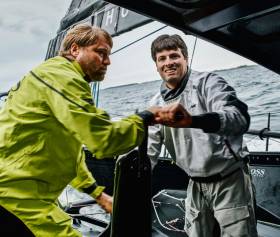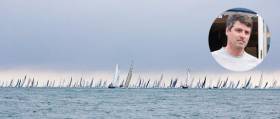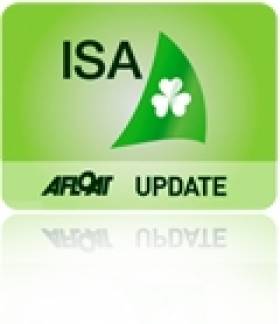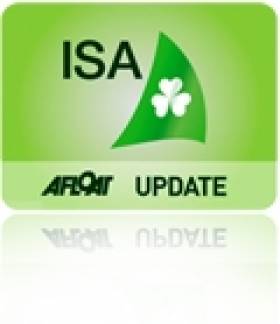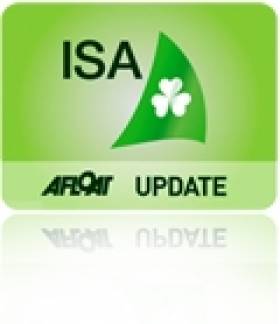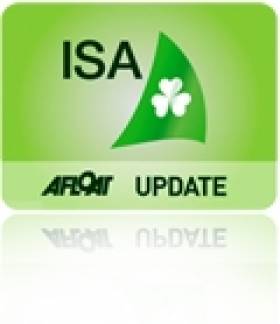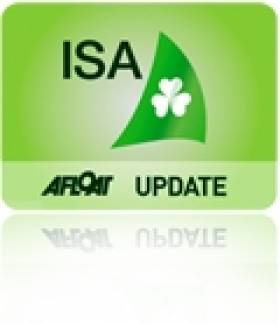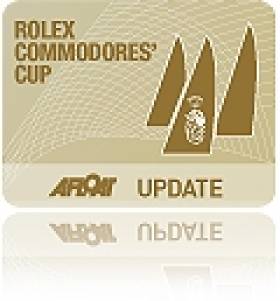Displaying items by tag: Nicholas O'Leary
Nin O’Leary Aims Even Higher With Alex Thomson Fastnet Berth
It was the coolest thing so far in all of 2017's sailing. In the midst of the Royal Cork DinghyFest which he was organising, Nin O’Leary took off for just one day to skipper Adam Gosling’s new JPK 10.80 Yes! In the huge-fleet Round the Island Race writes W M Nixon. In such a turnout, winning overall by a few seconds is the norm. But young Nin did it in style, something like eight minutes clear, an astonishing performance.
It was a massive achievement which did no harm at all in distracting attention from another project brewing up in the O’Leary camp in as much secrecy as could be managed. The Vendee Globe 2020, no less. This is very serious stuff. This afternoon, Afloat.ie can reveal that the first public step has been taken on the campaign trail, with Nin signing up to race as co-skipper with Alex Thompson on Hugo Boss in the Rolex Fastnet Race on August 6th. Now that - that is super cool. For those still gasping, here’s the Press Release:
British skipper Alex Thomson will compete in the Fastnet Race with Irish sailor Nin O’Leary which starts on Sunday 6th August. Thomson, who finished second in the Vendee Globe earlier this year stated ‘I am looking forward to taking part in the Fastnet again and to have Nin as my co-skipper. It is great to be able to support the new generation of offshore sailors.’ O’Leary, a young, talent in offshore sailing has been training with the Alex Thomson Racing team this summer and assisted the team in preparations ahead of the Vendee Globe in 2016 where he completed over 1500nm onboard HUGO BOSS. O’Leary stated ‘I am thrilled about the opportunity to race with Alex and onboard HUGO BOSS.Alex has set the benchmark in offshore sailing and being chosen to co-skipper the boat with him is a huge honour and allows me to start the preparation for my own Vendee Globe campaign in 2020. We are looking forward to a great race together.’
Royal Cork's Nin O'Leary Wins Round the Island Race on Saturday, Returns for Dinghy Fest Duty on Sunday
Nicholas 'Nin' O'Leary has had a successful weekend on and off the water in two countries. The Royal Cork ace organised this weekend's successful Dinghy Fest Regatta for over 100–boats in Crosshaven but in Cowes, UK, he also took Adam Gosling's JPK 10.80 YES! to an overall win of the 1342–boat Round the Island Race.
There were still a few hundred boats needing to finish their 2017 Round the Island Race yesterday, but mathematically none of them were able to dislodge Gosling's Irish crewed YES! from the top of the overall results, hence scoring them the biggest trophy of the day, the Gold Roman Bowl.
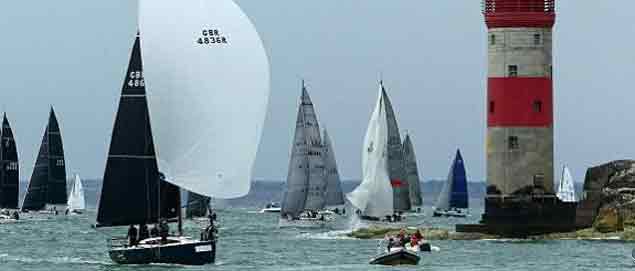 YES! Winners of the top trophy, the Gold Roman Bowl. Photo: Tony Marsh
YES! Winners of the top trophy, the Gold Roman Bowl. Photo: Tony Marsh
Gosling's crew included O'Leary and James Hynes. O'Leary, who was race director of Dinghy Fest at his Royal Cork Yacht Club, skipped to Cowes to participate in the massive UK race early on Saturday. As soon as O'Leary crossed the line, he was already making plans to be back in time to present the Dinghy Fest prizes at RCYC on Sunday.
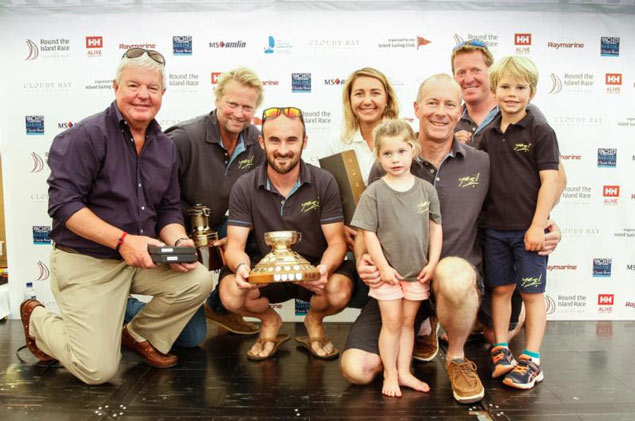 Adam Gosling & the crew of YES! joined by (left) Sir Keith Mills and Irish crew man James Hynes of Malahide (back row, right). Missing is Nin O'Leary who is already on his way back to Cork to present Dinghy Fest prizes (below). Photo: Paul Wyeth
Adam Gosling & the crew of YES! joined by (left) Sir Keith Mills and Irish crew man James Hynes of Malahide (back row, right). Missing is Nin O'Leary who is already on his way back to Cork to present Dinghy Fest prizes (below). Photo: Paul Wyeth
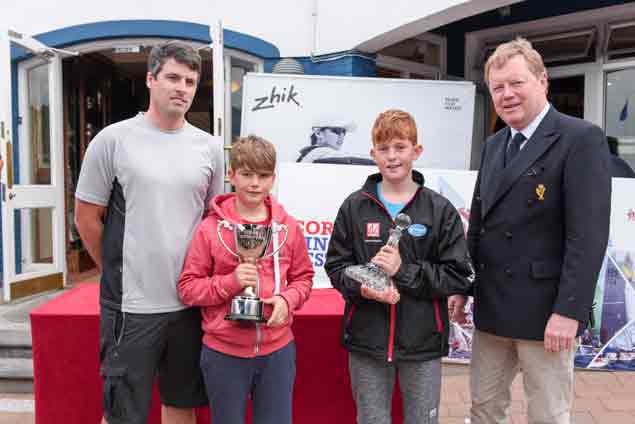 Round the Island race winner O'Leary (left) on Sunday afternoon with RCYC Admiral John Roche presenting the overall Dinghy Fest award to RS Feva sailors Harry and Simon Pritchard. Photo: Bob Bateman
Round the Island race winner O'Leary (left) on Sunday afternoon with RCYC Admiral John Roche presenting the overall Dinghy Fest award to RS Feva sailors Harry and Simon Pritchard. Photo: Bob Bateman
Often they say that the race is won either by the biggest or the smallest boats and for a time it looked like this would be a big boat race, after an impressive performance from Irvine Laidlaw's Reichel-Pugh 82, Highland Fling XI.
However, with Fling sitting at the top of the results table, Yes! and much of the rest of the IRC1 fleet within which she was racing, stormed home to dislodge a number of previous finishers from the top positions.
Highland Fling did manage to hold onto second, but ultimately Yes! was in another league taking victory by just under eight minutes corrected. Gosling's team a well-known group in the Solent and have won a great many trophies and plaudits but the Round the Island Race win had thus far eluded them.
They join a very special group of 81 winners from the illustrious race.
Nicholas O'Leary is Afloat's November Sailor of the Month
Nicholas "Nin" O'Leary of Cork has re-written the Irish sailing records, and he's only 24. The new All Ireland Champion Helm is clear winner of the Afloat.ie/Irish Independent "Sailor of the Month" award for November after a nail-biting finale in difficult conditions off Kinsale, making it three-in-a-row for this junior skipper who was winning major titles with impressive scorelines well before he was out of his teens.
The wind was drawing from the east for the 20th November shootout in the ISA's SailFleet of J/80s. But the challenge lay in the fact that, after a week of strong winds up to gale force, a massive swell was rolling in past the Bulman Buoy to provide sea conditions which were out of sync with the strength of the breeze.
Yet the three top Royal Cork helms showed they were up to the challenge. In fact, it was Neil Kenefick, in the championship through being tops in the ICRA series in 2010, who best got to grips with the racing in the early stages, posting two wins with Anthony O'Leary second in the first race, while son Nicholas was second in the next one.
But the junior O'Leary moved nearer to retaining the title by winning the third, though his father was right there with a second, while James Espey from the Lasers posted a third. However, Kenefick was in touch with a fourth, but that became his discount as he nailed a couple of thirds in the two concluding races.
Going into the fifth and final race, the three Crosshaven helms were neck-and-neck on points, but O'Leary Junior put it neatly away by slicing in ahead of his father, with Kenefick third. The Corkmen were out on their own, as next in line was Puppeteer 22 Champion Garret May, but he concluded with 18 net points, while Neil Kenefick was on 8, Anthony O'Leary on 7, and Nicholas O'Leary the supreme champion on 6. And making a bit of history while he was at it - the first three-in-a-row in the All Ireland's 64 years.
Nicholas O'Leary Produces Hat Trick in All Ireland Re Run
The All Ireland Championships at Kinsale today turned out in the end to be an event well worth the long wait and provided thrilling competition from start to finish writes Claire Bateman. It was sailed in a three metre swell between the Bullman Buoy and Sandycove. It was particularly difficult for the Race Committee under PRO David O'Brien in the continuous undulating swell.

Nicholas and his winning crew Adam McCarthy and Alex Barry in Kinsale this afternoon. Photo: Bob Bateman. More photos on the gallery HERE
After four races the Race Committee were calculating the results only to find that they had three Royal Cork crews tied on five points each including the twice previous holder Nicholas O'Leary, his father Anthony and Niall Kenefick who was sailing with his two sons David and George. And so the competition went down to the wire with the result dependant on the final race. Nicholas O'Leary triumphed taking his third consecutive Championship win, the first ever to do so, followed by Anthony O'Leary in second place and Niall Kenefick taking third place.
This exceptional result finally puts to bed any previous suggestions that local knowledge could prevail in the results by the competition taking place in the home club of the winner.
In his acceptance speech Nicholas said it was very difficult in the first race today to have to protest his father who was coming in on port to the mark but with a twinkle in his eye said it had to be done!
After it was all over one wag suggested to Nicholas that he should now seek to keep the trophy as he had won it three times in a row. The reply should be rather interesting!
Speaking at the reception afterwards the ISA said the three year sponsorship had now expired so they will be looking for new sponsors but such was their confidence in the continuance of the fleet they have already ordered new sails.
Results:
1. Nicholas O'Leary
2. Anthony O'Leary
3. Niall Kenefick
4. Garrett May
5. James Espey
6. Nick Walsh
7. Niall Henry
8. Ewen Barry
All Ireland Champs Move to Kinsale
The re-run of the All Ireland Sailing Championships will take place in Kinsale and not Crosshaven on November 20th according to a press release from the Irish Sailing Association published today.
A minimum of three races must be completed for the competition to conclude and the ISA Helmsman's Trophy awarded.
The final, originally scheduled to take place in Royal Cork Yacht Club on the 26th of September, had to be abandoned due to an absence of wind.
The competition will be sailed in the ISA SailFleet J80's which are currently based in Kinsale Yacht Club. Due to the difficulty in safely sailing the fleet from Kinsale to Crosshaven the venue had to be changed, however the host club remains Royal Cork Yacht Club who are now kindly assisted by Kinsale Yacht Club.
8 teams will be competing for the ISA Helmsmans Trophy. As this competition is recognised as a new event, no previous points shall be carried forward. Each competitor begins with a blank score card.
The finalists are:
Anthony O'Leary
Ewen Barry
Garrett May
James Espey
Neil Kenefick
Niall Henry
Nicholas O'Leary
Nick Walsh
Who'll win? We're starting a readers poll on Monday. Click back to cast your vote!
All Ireland Champs to Sail Again on November 20
After an abandonment due to lack of wind in early October and a long wait for news of a new date, the Irish Sailing Association has announced its All Ireland Championship will now take place on November 20th.The competitors have agreed to be available on this weekend to sail but the announcement on the ISA website does not name the venue, presumably the original location, Cork Harbour. the finalists and drawn boats are:
Final Flight
1. McCann Fitzgerald Anthony O'Leary
2. D/L Marina Neil Kenefick
3. O'Leary Insurance Ewen Barry
4. Smyths Toys Nicholas O'Leary
5. Dyno Rod Garrett May
6. Smart Niall Henry
7. KPMG James Espey
8. Irish Examiner Nick Walsh
ISA Seek New Date for All Ireland Event
Following the abandonment of the All Ireland Sailing Championships at Royal Cork last weekend due to lack of wind the Irish Sailing Association (ISA) has yet to announce dates for the rescheduled event. An autumn date to accomodate all concerned is the objective, the association said yesterday. The eight finalists involved are; Anthony O'Leary, Neil Kenefick, Nicholas O'Leary, Garrett May, Niall Henry, James Espey, Nick Walsh and Ewen Barry.
All Ireland Final Date Yet to be Agreed
Eight helmsmen, including the double winner Nicholas O'Leary will be invited to participate in a new final consisting of five races. The eight finallists are
Anthony O'Leary
Neil Kenefick
Nicholas O'Leary
Garrett May
Niall Henry
James Espey
Nick Walsh
Ewen Barry
Forum Discussion HERE
Defending Champion Enters Final After Light Air Contest
As a high pressure sits over Ireland the big question at tonight's Royal Cork celebration dinner for the All Ireland championships is what wind will there be for tomorrow's final?
After a second day of heats and with some racing postponed with light winds it is clear defending champion Nicholas O'Leary will be going through to tomorrow's final and a chance of a record breaking hat trick of wins in the event.
Just four knots of breeze showed for the first gun of the J80 fleet and although the sun was up the north east breeze kept shifting.
PRO for the J80 fleet, David O’Brien, got in two races for Flight 2. The third race was postponed and the race area was moved to the outer harbour at Ringabella Bay and Race 1 of Flight 3 was completed with a shortened course.
An attempt at a second race was abandoned when the wind shifted more into the west. However, on the second attempt having changed the course, a second race was completed in this Flight.
Pictures from Bob Bateman on the gallery HERE
Provisional results from Flight 3, Race 2
Boat Helm Race 2
5 Neil Kenefick 1
4 Flor O'Driscoll 2
3 Anthony O'Leary 3
6 James Espey 4
2 Sean Craig 5
1 Laurence Hanley 6
8 Andrew Creighton 7
*** *** ***
Provisional results from Flight 3, Race 1
Boat Helm Race 1
6 James Espey 1
3 Anthony O'Leary 2
5 Neil Kenefick 3
2 Sean Craig 4
1 Laurence Hanley 5
4 Flor O'Driscoll 6
8 Andrew Creighton 7
Due to light winds Race 3 from Flight 2 has been postponed.
Provisional Results from Flight 2, Race 1 & 2
Boat Helm Race 1 Race 2 Race 3
1 Nicholas O'Leary 123
8 Ewen Barry 235
6 Noel Butler 617
3 Daire O'Reilly 358
4 Jim Dempsey 448
2 Gordon Patterson 5712
5 Ben Duncan 7613
Commodores Cup: Send YOUR Good Luck Wishes HERE!
MANY OF YOU SENT GOOD LUCK WISHES AND NOW YOU CAN SAY WELL DONE TOO! SCROLL DOWN THE PAGE TO LEAVE YOUR CONGRATULATION MESSAGE!
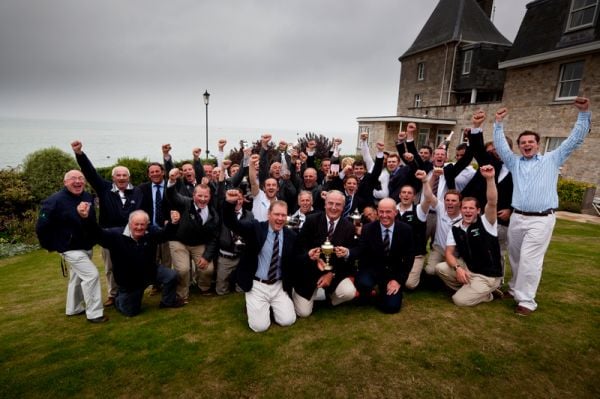
The ICRA Team Celebrations in Cowes, Photo: David Branigan
After a series of near misses in the Commodores Cup, there are many reasons why 2010 was an entirely appropriate timing for an Irish win in Cowes today.
Ireland's single three boat team (below) faced stiff opposition in the final ten team line up. Individual performances this season though, including a win at the British IRC Nationals, is proof, were it needed, that Ireland still was always on course to win the Commodores Cup.
Ireland's team on the Solent was Royal Cork based; Antix, Anthony O'Leary (Ker 39); Marinerscove.ie David Dwyer (Mills 39) and Roxy 6 Robert Davies (Corby 36). The full crew list for each boat is below, representing the very best of Irish sailing talent.
Third time lucky is how it was scripted in 08, but not how it was acted out. After first being jilted by the French and now, for the second time, by the English, the Irish could be forgiven for giving up on the cup but we never did. This victory represents the final week of eight months preparation for superb assault on the title.
PLEASE SCROLL DOWN TO THE END OF THE PAGE AND LEAVE YOUR CONGRATULATIONS MESSAGE!

Team Ireland 2010 Commodores Cup
Photos by Robert Bateman
IRL3939 Antix Anthony O'Leary (Ker 39)
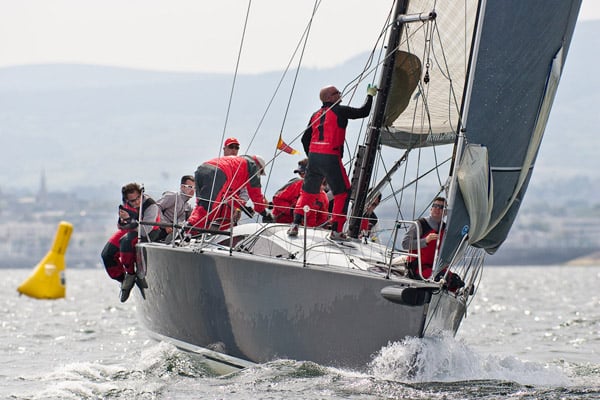
Anthony O'Leary (IRL)
David Lenz (GBR)
Peter O'Leary (IRL)
Ross Deasy (IRL)
Brian Lennon (IRL)
Stephen O'Sullivan (IRL)
Eoin Leahy (IRL)
Frederick Cudmore (IRL)
Simon Johnson (IRL)
Rory O'Sullivan (IRL)
Jimmy Houston (GBR)
Derek Moynan (IRL)
Tom Durcan (IRL)
Robert O'Leary (IRL)
Darragh O'Connor (IRL)
IRL39000 Marinerscove.ie David Dwyer (Mills 39)
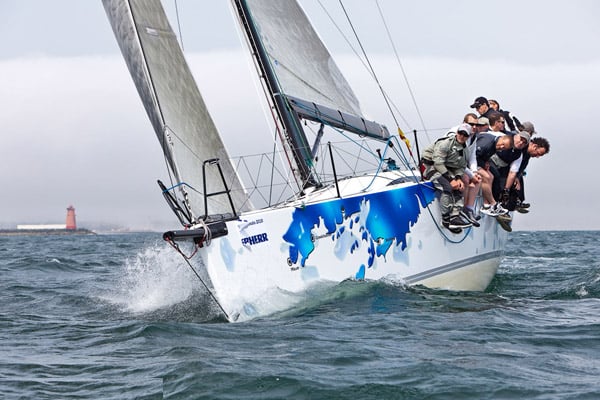
Andy Beadsworth (GBR)
David Bolton (IRL)
Padraig Byrne (IRL)
Alan Curran (IRL)
David Dwyer (IRL)
Bernard Fitzpatrick (IRL)
Brian Heneghan (IRL)
David Love (IRL)
Tom Murphy (IRL)
Nicholas O'Leary (IRL)
Clive O'Shea (IRL)
Sandy Rimmington (IRL)
Chris Schirmer (GBR)
Don Wilson (IRL)
IRL36000 Roxy 6 Robert Davies (Corby 36)
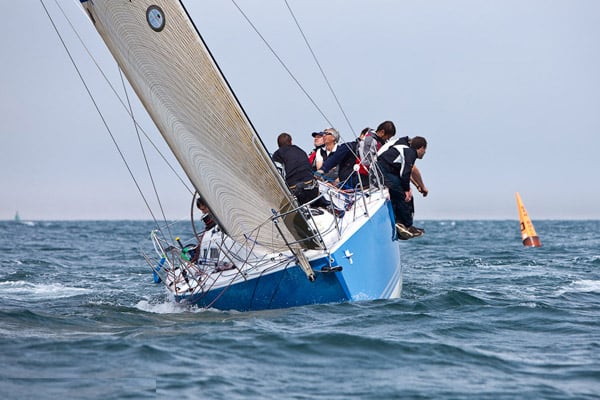
Rob Davies (GBR)
Andrew Creighton (IRL)
Marty O'Leary (IRL)
Jim Hughes (IRL)
Paul Farries (GBR)
Nelson Moore (IRL)
Tom Whitburn (GBR)
Michael Liddy (IRL)
Aidan O'Connell (IRL)
Maurice O'Connell (IRL)
Team Management:
Barry Rose, Fintan Cairns, Denis Kiely, Mike Broughton and Norbert Reilly
- RORC
- Anthony O'Leary
- Norbert Reilly
- ICRA
- Eoin Leahy
- Maurice O'Connell
- Commodores Cup
- Fintan Cairns
- Peter O'Leary
- antix
- Mike Broughton
- roxy 6
- Mariners Cove
- David Lenz
- Ross Deasy
- Brian Lennon
- Stephen O'Sullivan
- Frederick Cudmore
- Simon Johnson
- Rory O'Sullivan
- Jimmy Houston
- Derek Moynan
- Tom Durcan
- Robert O'Leary
- Darragh O'Connor
- Andy Beadsworth
- David Bolton
- Padraig Byrne
- Alan Curran
- David Dwyer
- Bernard Fitzpatrick
- Brian Heneghan
- David Love
- Tom Murphy
- Nicholas O'Leary
- Clive O'Shea
- Sandy Rimmington
- Chris Schirmer
- Don Wilson
- Rob Davies
- Andrew Creighton
- Marty O'Leary
- Jim Hughes
- Paul Farries
- Nelson Moore
- Tom Whitburn
- Michael Liddy
- Aidan O'Connell
- Barry Rose
- Denis Kiely


























